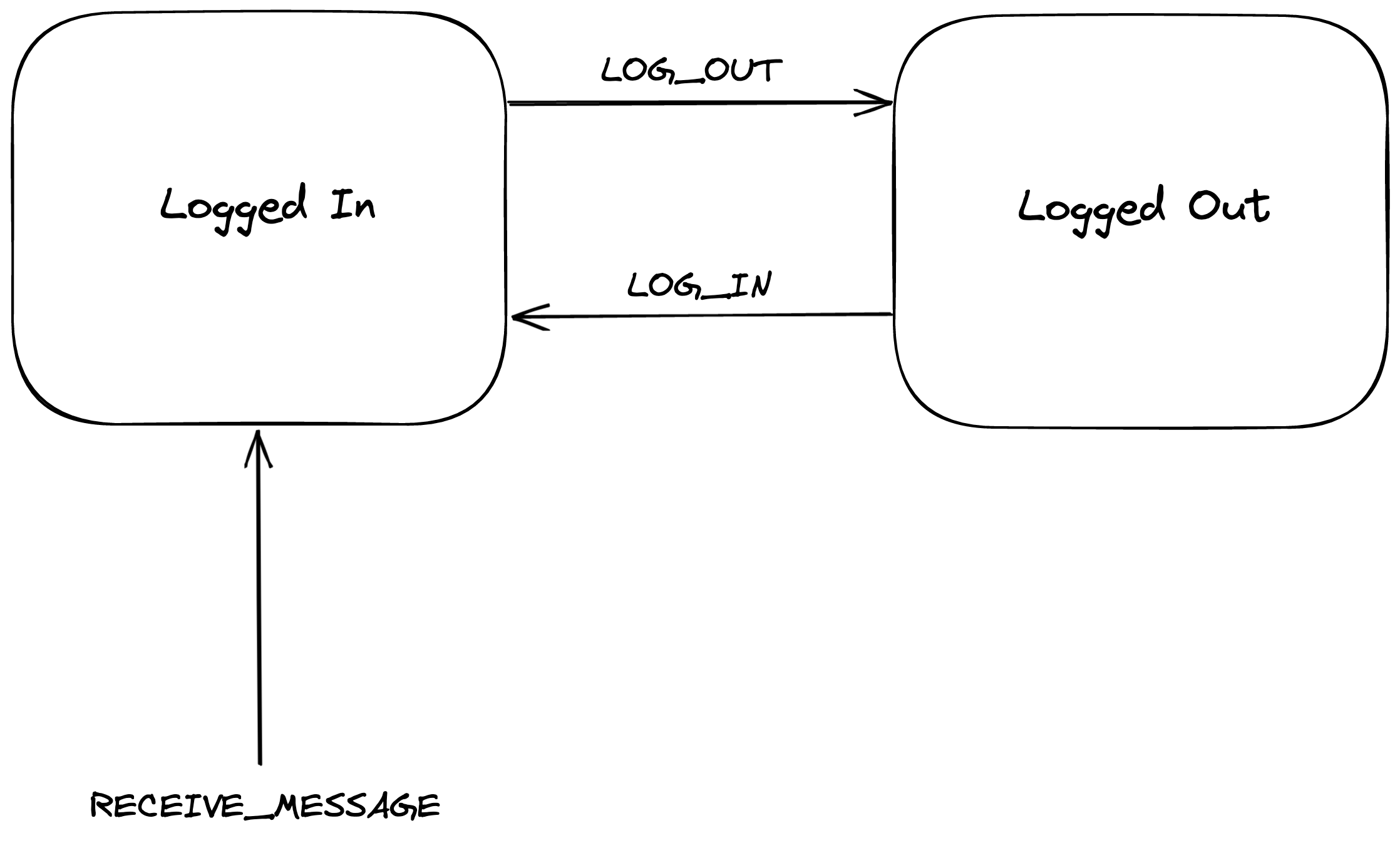Erlang is a functional language that implements pattern matching. We can make use of this great feature to create declarative state machines.
What is a state machine? In its simplest form, a state machine is an abstract machine that has a finite set of states and is at any time in only one of them. It goes from one state to another one in reaction to an input, also called an event, and this transformation is called a transition.
permalinkImplement state machines from hands
Let’s imagine a chat system with really basic authentication: a user can be either logged in or logged out, and can receive messages only when logged in.
When in logged in state, user can log out; when in logged out state, user can log in.
These interactions are schematized below.

Let’s implement this state machine in Erlang without any library, by making great use of pattern matching.
permalinkThe State Handlers
We create a module named fsm_auth.
erlang
We create two functions, each one representing a state. These state handlers will be called when an event is received by the state, respectively when it’s in logged_in state and in logged_out state. The _Context is some data, shared across state handlers. We will use it to keep track of received messages.
Let’s create a function clause for each state handler, so that we can switch between logged_in and logged_out states in response to log_out and log_in events.
erlang
If in logged_in state we receive a log_out event, we will go to logged_out. Conversely, if in logged_out state we receive log_in event, we will go to logged_in.
We express a transition by using a tuple with as first entry the atom next_state and as second entry, the state to go to.
If we receive an event we do not want to catch, we want to stay in the current state. We can use keep_state to do this:
erlang
Now that we scaffolded our state handlers and designed a beggining of API, it’s time to implement an interpreter that will listen to events, call matching state handlers and understand their return value to update the machine state.
permalinkThe Interpreter
erlang
We create a function loop/0 that calls loop/2, which is our event loop with the initial state and the initial context:
erlang
The default state is logged_out and the context in an empty dictionnary.
In loop/2 we take the current state and the current context as parameters. We are waiting for messages and keep only those matching {event, Event} pattern:
erlang
It means that events will have to be sent to the machine process by using this pattern:
erlang
For example, to send log_in event, we would have to write that statement:
erlang
Then we call call_state_handler that calls the appropriate state handler with the event and the context.
erlang
Finally in loop/2 we match HandlerReturn against {keep_state} and {next_state, NewState}. If {keep_state} matches, we call loop/2 without changing neither the state nor the context. If {next_state, NewState} matches we call loop/2 with the new state and we keep the context.
erlang
Now we need to spawn loop/0 and make our state machine a real actor.
erlang
We create start/0 function that spawns fsm_auth:loop/0 function and returns the PID of the actor.
Let’s add some logs to ensure our machine works correctly.
erlang
After that we can play with our state machine by using Erlang interpreter, erl.
txt
permalinkReceive messages
Now that we have a working state machine, let’s implement messages receiving, only in logged_in state.
erlang
We add a clause to logged_in function to match send_message event. We update messages property from Context dict and preprend the received message. Now we return keep_state with the updated context.
As a consequence we have to update the interpreter:
erlang
We update the initial context so that it contains an empty list of messages:
erlang
We now have the following module:
erlang
We can test it with erl interpreter:
md
Great! When we are in logged_out state and we receive a message, it’s discarded. But when we are in logged_in state, messages are put in the context.
permalinkConclusion
Erlang’s implementation of the Actor Model is fabulous and amazing to use.
Thanks to Erlang’s pattern matching, it’s easy to write declarative state machines.
By combining both features, we get a powerful tool to build predictable actors systems where actors behaviours have to be made explicit.
You can find the code of this article on Github.